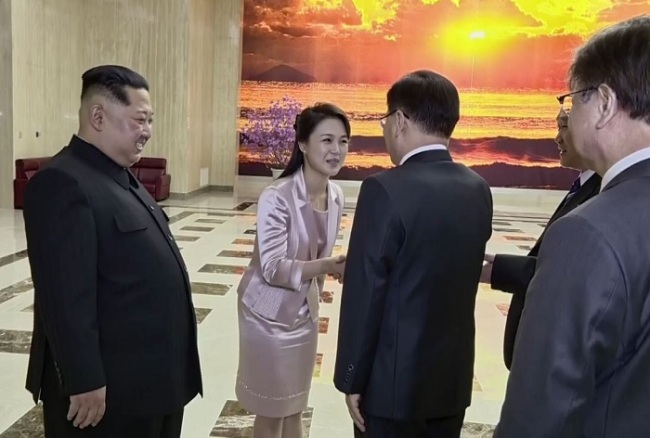WASHINGTON -- North Korea's offer to discuss its nuclear weapons program with the United States marks a possible end to the two countries' impasse, but it remains to be seen what the regime's intentions are, according to US analysts Tuesday.
In a surprise move, North Korean leader Kim Jong-un told a South Korean presidential delegation Monday that he would be willing to give up his nuclear pursuit in return for a security guarantee. He also offered to halt nuclear and ballistic missile tests if Washington agreed to hold talks with the regime.
US President Donald Trump tweeted in response that he saw "possible progress" and noted "a serious effort" being made by all parties concerned.
Whether Trump will ultimately agree to talks with North Korea will depend on Pyongyang's next steps, said Ken Gause, a North Korea expert who is director of the International Affairs Group at CNA Corp.
"Pyongyang will have its own demands, some of which may be hard to swallow," he said in comments to Yonhap. "Depends on whether North Korea is truly willing to enter talks on denuclearization without preconditions, such as making demands on the back side."

If North Korea calls for an end to joint military exercises between South Korea and the US, Washington could refuse to meet, he said. North Korea has long condemned the drills as rehearsals for an invasion.
Trump is likely to decide on his next move after being briefed on the Koreans' meeting. South Korean President Moon Jae-in's top national security adviser, Chung Eui-yong, and National Intelligence Service chief Suh Hoon are scheduled to travel to Washington later this week to brief US officials on their meeting with Kim.
But according to Scott Snyder, chief Korea analyst at the Council on Foreign Relations, the North Koreans "need to communicate their intentions directly to the United States" in addition to having Chung play an intermediary role.
He acknowledged that the pledge to suspend nuclear and missile tests is an "important potential development that could shape a positive environment for negotiations."
Growing economic and diplomatic sanctions against Pyongyang appear to be having an effect, said Robert Manning, a senior fellow at the Atlantic Council think tank.
"That Pyongyang has suddenly put its nuclear weapons program back on the table underscores that comprehensive economic sanctions have disrupted their economy and are causing significant pain," he said. "The Trump administration deserves credit for mobilizing the global community to isolate North Korea and getting tough UN Security Council resolutions on sanctions passed."
Manning argued there is no reason for Washington to hesitate to begin exploratory talks.
"(US Secretary of State) Rex Tillerson should be on the next flight to Pyongyang," he said. "It is important to have parallel US-North Korea and North-South talks, to minimize any gap in the (South Korea) and US approach to North Korea."
As to whether Pyongyang appears to be serious about giving up its nuclear program, the analysts offered diverging views based on the premise the regime intends to ensure its survival.
"If Kim can get a better guarantee than that provided by nukes, as Kim intimated, then the nukes are no longer needed," Snyder said.
Gause, however, pointed out, "We are a long way from that point. It will take a lot of carrots and confidence building for Kim to begin a serious dismantling of the program." (Yonhap)








![[Hello India] Hyundai Motor vows to boost 'clean mobility' in India](http://res.heraldm.com/phpwas/restmb_idxmake.php?idx=644&simg=/content/image/2024/04/25/20240425050672_0.jpg&u=)











